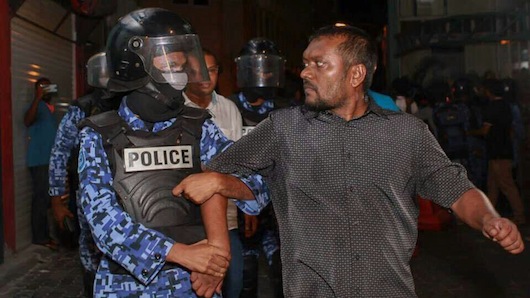A 15-day incarceration at the Dhoonidhoo detention centre drove home the immensity of President Mohamed Nasheed’s sacrifices for the sake of democracy, opposition Maldivian Democratic Party (MDP) MP Fayyaz Ismail has said.
The MP for Laamu Gan was arrested during a demonstration on March 6 and held in remand detention after refusing the Criminal Court’s condition for release of not attending protests for 60 days.
“When I came home to my family upon my release, that’s when I realised what President Nasheed had sacrificed before and what he continues to sacrifice,” Fayyaz told Minivan News in an interview today.
People knew of Nasheed’s sacrifices at “an abstract level”, Fayyaz explained, but his own “personal experience” made him realise the hardship the opposition leader has been through.
“Why is he making this sacrifice? For future generations. So we need to do everything we can once again to restore a people’s government,” he said.
Prior to his election in 2008, Nasheed was imprisoned over a dozen times for dissident activities during the 30-year reign of former President Maumoon Abdul Gayoom.
Fayyaz, who lives with his wife and five-year-old daughter, said his detention was the longest period he had been separated from his family.
He added that it was difficult to explain to his daughter why he had been away from home for so long.
“When they are so young, we do not want to tell them the way their authorities is acting is wrong, otherwise they will be prejudiced towards those institutions. So it was very difficult for me to tell her why her father was away for such a long time,” he said.
The MDP has been protesting in the capital every night since Nasheed’s arrest on February 22.
On March 13, the opposition leader was found guilty of ordering the military to “forcibly abduct” Criminal Court Chief Judge Abdulla Mohamed and sentenced to 13 years in prison.
Conditional release
Recalling his arrest and remand hearing, Fayyaz said police had requested the Criminal Court judge to extend his detention.
“Since I had no criminal record, the judge ordered my release with a condition of avoiding participation in protests for 60 days,” he said.
“But I refused to accept that condition. I told them protesting was a right guaranteed to me by the Constitution. When I said so, I think the judge was displeased, and he ordered for me to be locked up for another 15 days.”
Fayyaz noted that under the Constitution, an individual could only be held in custody prior to sentencing if there was either a “danger of the accused absconding or not appearing at trial, [for] the protection of the public, or danger of influencing witnesses or tampering with evidence.”
He questioned how the Criminal Court judge could decide he was “suddenly a danger to the society,” just after ordering his release on the condition of staying away from protests.
He advised others arrested during protests to refuse the conditional release and appeal the court’s decision.
“We believe that the judiciary has also been politically influenced. I do not think that anyone with a good conscience could accept that the judiciary is independent,” Fayyaz said.
“So I think the judiciary’s intention behind these conditions is to discourage protesting.”
Fayyaz also said his detention changed the way he perceived the police and gave him hope. He praised the “professionalism and kindness” shown to him by individual officers at the Dhoonidhoo Detention Center.
He suggested that the issue was with “leaders abusing the system” rather than policemen, who he said were “good people.”
Fayyaz said he had not decided to make a principled stand before appearing before the judge for the remand hearing, adding that the defiance “came naturally.”
“Even in my profession as a lawyer, we are seeing corruption and influence into these things. So in such an environment, we have to protest. If we do not protest today, tomorrow we will not be able to even talk like this,” he said.
Likes (4)Dislikes
(4)Dislikes (0)
(0) 